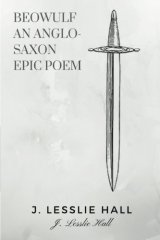Beowulf Page #2
Beowulf is an Old English epic poem consisting of 3,182 alliterative lines. It is one of the most important works of Old English literature. The date of composition is a matter of contention among scholars; the only certain dating pertains to the manuscript, which was produced between 975 and 1025.
Joy is renewed at Heorot. Congratulations crowd upon the victor. Hrothgar literally pours treasures into the lap of Beowulf; and it is agreed among the vassals of the king that Beowulf will be their next liegelord. Beowulf leaves Dane-land. Hrothgar weeps and laments at his departure. When the hero arrives in his own land, Higelac treats him as a distinguished guest. He is the hero of the hour. Beowulf subsequently becomes king of his own people, the Geats. After he has been ruling for fifty years, his own neighborhood is wofully harried by a fire-spewing dragon. Beowulf determines to kill him. In the ensuing struggle both Beowulf and the dragon are slain. The grief of the Geats is inexpressible. They determine, however, to leave nothing undone to honor the memory of their lord. A great funeral-pyre is built, and his body is burnt. Then a memorial-barrow is made, visible from a great distance, that sailors afar may be constantly reminded of the prowess of the national hero of Geatland. The poem closes with a glowing tribute to his bravery, his gentleness, his goodness of heart, and his generosity. * * * * * It is the devout desire of this translator to hasten the day when the story of Beowulf shall be as familiar to English-speaking peoples as that of the Iliad. Beowulf is our first great epic. It is an epitomized history of the life of the Teutonic races. It brings vividly before us our forefathers of pre-Alfredian eras, in their love of war, of sea, and of adventure. My special thanks are due to Professors Francis A. March and James A. Harrison, for advice, sympathy, and assistance. J.L. HALL. [xi] ABBREVIATIONS USED IN THE NOTES. B. = Bugge. C. = Cosijn. Gr. = Grein. Grdvtg. = Grundtvig. H. = Heyne. H. and S. = Harrison and Sharp. H.-So. = Heyne-Socin. K.= Kemble. Kl. = Kluge. M.= Müllenhoff. R. = Rieger. S. = Sievers. Sw. = Sweet. t.B. = ten Brink. Th. = Thorpe. W. = Wülcker. * * * * * BIBLIOGRAPHY OF TRANSLATIONS. ~Arnold, Thomas.~--Beowulf. A heroic poem of the eighth century. London, 1876. With English translation. Prose. ~Botkine, L.~--Beowulf. Epopée Anglo-Saxonne. Havre, 1877. First French translation. Passages occasionally omitted. ~Conybeare, J.J.~--Illustrations of Anglo-Saxon Poetry. London, 1826. Full Latin translation, and some passages translated into English blank-verse. ~Ettmuller, L.~--Beowulf, stabreimend übersetzt. Zürich, 1840. ~Garnett, J.M.~--Beowulf: an Anglo-Saxon Poem, and the Fight at Finnsburg. Boston, 1882. An accurate line-for-line translation, using alliteration occasionally, and sometimes assuming a metrical cadence. ~Grein, C.W.M.~--Dichtungen der Angelsachsen, stabreimend übersetzt. 2 Bde. G� ttingen, 1857-59. ~Grion, Giusto.~--Beovulf, poema epico anglo-sassone del VII. secolo, tradotto e illustrato. Lucca, 1883. First Italian translation. ~Grundtvig, N.F.S.~--Bjowulfs Drape. Copenhagen, 1820. ~Heyne, M.~--A translation in iambic measures. Paderborn, 1863. ~Kemble, J.M.~--The Anglo-Saxon Poems of Beowulf, the Traveller's Song, and the Battle of Finnsburg. London, 1833. The second edition contains a prose translation of Beowulf. ~Leo, H.~--Ueber Beowulf. Halle, 1839. Translations of extracts. [xii] ~Lumsden, H.W.~--Beowulf, translated into modern rhymes. London, 1881. Ballad measures. Passages occasionally omitted. ~Sandras, G.S.~--De carminibus Cædmoni adjudicatis. Paris, 1859. An extract from Beowulf, with Latin translation. ~Schaldmose, F.~--Beowulf og Scopes Widsith, to Angelsaxiske Digte. Copenhagen, 1847. ~Simrock, K.~--Beowulf. Uebersetzt und erläutert. Stuttgart und Augsburg, 1859. Alliterative measures. ~Thorkelin, G.J.~--De Danorum rebus gestis secul. III. et IV. poema Danicum dialecto Anglosaxonica. Havniæ, 1815. Latin translation. ~Thorpe, B.~--The Anglo-Saxon Poems of Beowulf, the Scôp or Gleeman's Tale, and the Fight at Finnsburg. Oxford, 1855. English translation in short lines, generally containing two stresses. ~Wackerbarth, A.D.~--Beowulf, translated into English verse. London, 1849. ~Wickberg, R.~--Beowulf, en fornengelsk hjeltedikt, � fersatt. Westervik. First Swedish translation. ~von Wolzogen, H.~--Beowulf, in alliterative measures. Leipzig. ~Zinsser, G.~--Der Kampf Beowulfs mit Grendel. Jahresbericht of the Realschule at Forbach, 1881. [xiii] GLOSSARY OF PROPER NAMES. * * * * * [The figures refer to the divisions of the poem in which the respective names occur. The large figures refer to fitts, the small, to lines in the fitts.] * * * * * ~Ælfhere~.--A kinsman of Wiglaf.--363. ~Æschere~.--Confidential friend of King Hrothgar. Elder brother of Yrmenlaf. Killed by Grendel.--213; 3089. ~Beanstan~.--Father of Breca.--926. ~Beowulf~.--Son of Scyld, the founder of the dynasty of Scyldings. Father of Healfdene, and grandfather of Hrothgar.--118; 21. ~Beowulf~.--The hero of the poem. Sprung from the stock of Geats, son of Ecgtheow. Brought up by his maternal grandfather Hrethel, and figuring in manhood as a devoted liegeman of his uncle Higelac. A hero from his youth. Has the strength of thirty men. Engages in a swimming-match with Breca. Goes to the help of Hrothgar against the monster Grendel. Vanquishes Grendel and his mother. Afterwards becomes king of the Geats. Late in life attempts to kill a fire-spewing dragon, and is slain. Is buried with great honors. His memorial mound.--626; 72; 79; 93; 98; 1228; 1243; 231, etc. ~Breca~.--Beowulf's opponent in the famous swimming-match.--98; 919; 921; 922. ~Brondings~.--A people ruled by Breca.--923. ~Brosinga mene~.--A famous collar once owned by the Brosings.--197. ~Cain~.--Progenitor of Grendel and other monsters.--256; 2011. ~Dæghr efn~.--A warrior of the Hugs, killed by Beowulf.--3540. ~Danes~.--Subjects of Scyld and his descendants, and hence often called Scyldings. Other names for them are Victory-Scyldings, Honor-Scyldings, Armor-Danes, Bright-Danes, East-Danes, West-Danes, North-Danes, South-Danes, Ingwins, Hrethmen.--11; 21; 32; 514; 71, etc. ~Ecglaf~.--Father of Unferth, who taunts Beowulf.--91. ~Ecgtheow~.--Father of Beowulf, the hero of the poem. A widely-known Wægmunding warrior. Marries Hrethel's daughter. After slaying Heatholaf, a Wylfing, he flees his country.--73; 56; 84. ~Ecgwela~.--A king of the Danes before Scyld.--2560. [xiv] ~Elan~.--Sister of Hrothgar, and probably wife of Ongentheow, king of the Swedes.--210. ~Eagle Cape~.--A promontory in Geat-land, under which took place Beowulf's last encounter.--4187. ~Eadgils~.--Son of Ohthere and brother of Eanmund.--342. ~Eanmund~.--Son of Ohthere and brother of Eadgils. The reference to these brothers is vague, and variously understood. Heyne supposes as follows: Raising a revolt against their father, they are obliged to leave Sweden. They go to the land of the Geats; with what intention, is not known, but probably to conquer and plunder. The Geatish king, Heardred, is slain by one of the brothers, probably Eanmund.--3610; 3154 to 3160; 3366 to 34_6.
Translation
Translate and read this book in other languages:
Select another language:
- - Select -
- 简体中文 (Chinese - Simplified)
- 繁體中文 (Chinese - Traditional)
- Español (Spanish)
- Esperanto (Esperanto)
- 日本語 (Japanese)
- Português (Portuguese)
- Deutsch (German)
- العربية (Arabic)
- Français (French)
- Русский (Russian)
- ಕನ್ನಡ (Kannada)
- 한국어 (Korean)
- עברית (Hebrew)
- Gaeilge (Irish)
- Українська (Ukrainian)
- اردو (Urdu)
- Magyar (Hungarian)
- मानक हिन्दी (Hindi)
- Indonesia (Indonesian)
- Italiano (Italian)
- தமிழ் (Tamil)
- Türkçe (Turkish)
- తెలుగు (Telugu)
- ภาษาไทย (Thai)
- Tiếng Việt (Vietnamese)
- Čeština (Czech)
- Polski (Polish)
- Bahasa Indonesia (Indonesian)
- Românește (Romanian)
- Nederlands (Dutch)
- Ελληνικά (Greek)
- Latinum (Latin)
- Svenska (Swedish)
- Dansk (Danish)
- Suomi (Finnish)
- فارسی (Persian)
- ייִדיש (Yiddish)
- հայերեն (Armenian)
- Norsk (Norwegian)
- English (English)
Citation
Use the citation below to add this book to your bibliography:
Style:MLAChicagoAPA
"Beowulf Books." Literature.com. STANDS4 LLC, 2025. Web. 20 Jan. 2025. <https://www.literature.com/book/beowulf_945>.




Discuss this Beowulf book with the community:
Report Comment
We're doing our best to make sure our content is useful, accurate and safe.
If by any chance you spot an inappropriate comment while navigating through our website please use this form to let us know, and we'll take care of it shortly.
Attachment
You need to be logged in to favorite.
Log In